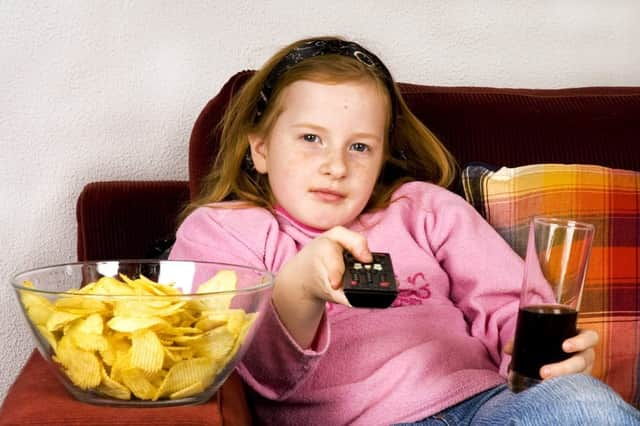'Too much telly at age two makes for unhealthy teenagers'


Couch potato tots who watch too much telly are more likely to be junk food addicts by the time they are teenagers, warns new research.
The risk of bad eating habits at the age of 13 rose eight per cent - for every hourly increase in viewing they sat glued to the screen when they were two, according to the study.
Advertisement
Hide AdAdvertisement
Hide AdThey consumed more chips, burgers, white bread, snacks, desserts and fizzy drinks than those whose screen time was restricted as toddlers.
They were also prone to skipping breakfast and doing less well at school.
Professor Linda Pagani, of Montreal University's School of Psychoeducation, said: "This study tells us over-indulgent lifestyle habits begin in early childhood and seem to persist throughout the life course.
"An effortless existence creates health risks. For our society that means a bigger health care burden associated with obesity and lack of cardiovascular fitness."
Breakfast TV
Advertisement
Hide AdAdvertisement
Hide AdEarly TV viewing also reduced eating of breakfast on school days by ten per cent - and led to more overall screen time by adolescence.
Each hour predicted a ten per cent increase in BMI (body mass index) and less effort in the first year of secondary school - ultimately affecting performance and ambition.
Recent research has suggested Britain is raising a generation of gogglebox addicts - with under fives spending almost seven hours a day watching TV.
Parents have been blamed for using the screen as a babysitter to keep the kids quiet while they get on with chores or grab some 'me time'.
Advertisement
Hide AdAdvertisement
Hide AdThe study published in Preventive Medicine, graduate student Isabelle Simonato followed nearly 2,000 Canadian boys and girls born betweeen spring 1997 and 1998 from when they were five months.
After their second birthday parents reported on their daily TV viewing habits.
Then, at 13, the youngsters themselves were asked about their diets and behaviour in school.
TVOD
Prof Pagani said: "Not much is known about how excessive screen exposure in early childhood relates to lifestyle choices in adolescence.
Advertisement
Hide AdAdvertisement
Hide Ad"This birth cohort is ideal because the children were born before smartphones and tablets - and before any paediatric viewing guidelines were publicised for parents to follow.
"They were raising their children with TV and seeing it as harmless.
"This makes our study very naturalistic with no outside guidelines or interference - a huge advantage."
The adolescents who watched more TV as toddlers ate more chips, processed meats and cold cuts, white bread, salty or sweet snacks and desserts.
Advertisement
Hide AdAdvertisement
Hide AdThey also guzzled more regular and diet soft drinks, fruit-flavoured beverages and sports and energy drinks.
Co-author Ms Simonato said: "Watching TV is mentally and physically sedentary behaviour because it does not require sustained effort.
"We hypothesised when toddlers watch too much TV it encourages them to be sedentary and if they learn to prefer effortless leisure activities at a very young age they likely won't think much of non-leisure ones - like school - when they're older."
Switch-off
The researchers also measured their results against revised screen time guidelines by the American Academy of Paediatrics, which reduced the amount of daily viewing from two to one hour-a-day for children between two and five.
Advertisement
Hide AdAdvertisement
Hide AdCompared to those who viewed less than one hour a day at two, those who watched one to four a day later had less healthy diets at 13, skipped breakfast on weekdays, had a higher BMI, engaged in more intense screen time and were less engaged as students.
Ms Simonato said: "Because we had a lot of information on each child and family we were able to eliminate other psychological and socio-demographic factors that could have explained the results - which is a really ideal situation.
"We even removed any influence of screen time habits at age 13 to really isolate long-term associations with toddler viewing."
Prof Pagani said: "In pre-school parents use screen time as a reward and as a distraction.
Advertisement
Hide AdAdvertisement
Hide Ad"They establish quiet 'idling' at a teachable moment when children could actually be learning self-control.
"Using distraction as a reward to help children behave in situations where they should be learning self-control sets them on a trajectory where they will seek out distraction when faced with demands for cognitive effort.
Easy entertainment
"Rewarding distraction and low mental effort via entertainment will later influence a young person's commitment to school and perseverance in their studies.
"So we believe the AAP guidelines of not more than one hour of TV viewing for young children is correct - to ensure healthy developmental trajectories in adolescence."
Advertisement
Hide AdAdvertisement
Hide AdIn October 2015 a survey of 2,000 mums and dads in the UK found more than three quarters did not limit or monitor the amount of time their pre-school kids spent watching TV.
And they revealed Netflix and cartoons were the youngsters' must-see channels with the average daily viewing time six hours and 48 minutes.
Eight-in-ten used the TV to buy some peace and quiet at home and six in ten used it as a distraction so they could get on with housework.
Almost half said it was a soothing influence if their child had a tantrum and a third used it as a sleep aid.
Only one in five gave their child a toy to play with as a way of keeping them occupied.